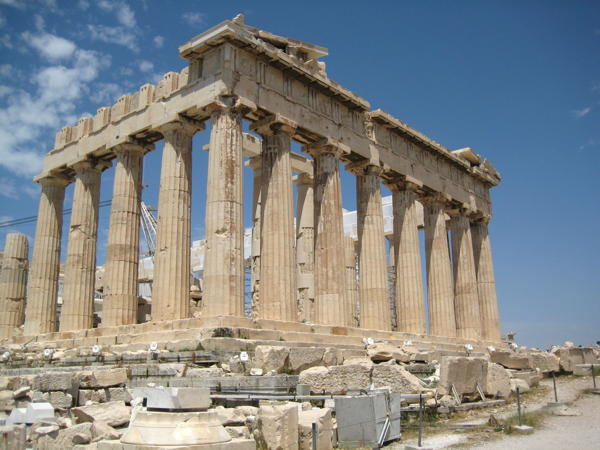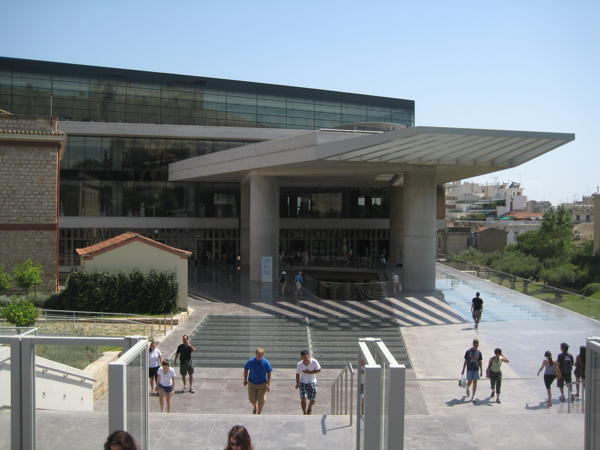ΑΘΗΝΑ¶
1395 words on Travel
Thanks to a bit of spontaneity and an affordable flight still being available a few days before, I found myself in Athens visiting my brother and the origin of European civilisation last week.
The stay was pleasant and included visits to the main tourist attractions like – obviously – the Acropolis the new Acropolis Museum, the Temple of Olympian Zeus, the Ancient Agora, the Panathenaic Stadium, Kerameikos, Cape Sounion and even a beach down the coast.
It is hot in Athens in June. Temperatures well over 30°C made walking around a bit strenuous. And they seem to consider June ‘low’ season with July apparently starting to be seriously hot and seeing the natives flee to the islands. The high temperatures meant that details like air conditioning in buses suddenly became very much appreciated conveniences.
Also due to the heat it is good – or even necessary – to drink a lot. To our surprise, we found that every kiosk in town – and there is one every hundred metres or so – sells a small bottle of chilled water for 50 cents and a large one for a Euro. Knowing the typical rip-off pricing for bottled water that seemed surprisingly sane. Later we learned that in Greece there’s simply a law forcing people to sell water at these prices. Reasonable and healthy, I think, making it a no-brainer to drink enough.
For the first days of my stay the metro was on strike. Not only did this give me a first taste of Athenian traffic when having to take the X95 bus into town from the airport which required well over twice the time, twenty minutes of which for the last kilometre towards Syntagma square due to the crazy Athenian traffic. When experiencing said traffic later on, I had the impression that it’s hell for car drivers, OK-ish for a pedestrian as you can sneak through and the car drivers are friendly. You’ll just have to look out for scooters which will quickly sneak through between cars and with the driver ‘wearing’ his helmet on the left arm and holding a cigarette in his right hand while doing so.
While the metro system is good – and at €1 a pop, €3 a day, €10 a week rather cheap – this meant we had to rely on buses for a few days. There are buses trolley buses and a few trams which give good coverage of the city. The only problem being that there doesn’t seem to be a plan telling you how the bus network works. You’ll have to walk up to the bus stops which carry a description of the route of the buses stopping there and then try to figure out which bus is the right one. While I do know my Greek alphabet, this also drove home that knowing an alphabet and being able to read whole words at a reasonable speed are two entirely different things. Not the easiest way to get around, but it still worked surprisingly well.
One day, when the buses were striking as well, we hired a car and went to see the sunset (and ruins) at Cape Sounion, stopping for a beach on the way. You pay a few Euros and get some umbrella and beach chairs at a small beach with crystal clear blue and rather warm water. Not the worst way to spend a day, I think.
Most of the sightseeing included Greece’s specialty: ruins (In that respect it quite reminded me of Ireland, only that things are significantly older and it’s constantly sunny instead of raining). All the ruins we visited in Athens are carefully preserved, guarded by charming young ladies and very fairly priced (€12 for a combination ticket, free with a EU student card). While I am amazed by the fact that people were able to build these things so many centuries ago [probably more a result of slave labour than of democracy, alas] I don’t find them very interesting per se because I lack the background of knowing all the different styles and I also lack the phantasy to interpret a row of stones into an ancient building and the histories associated with it. As the sites usually only offer very superficial descriptions, I can only guess that having fully fledged archaeologist explanations may make them more interesting.
The Acropolis – as well as the theatres on the slopes of its hill – is amazing, and the new Acropolis Museum is as well. In fact, I consider it one of the best museums I have seen. It is a modern, good-looking (and well-air-conditioned) building, the exhibition in which starts off with countless ceramics found on the sites, then continues to show sculptures and, on the top floor, presents a short film on the history of the Acropolis (built in ancient Greece mainly to host a sculpture and show how rich and cool they are, then conquered with the city by many different parties over the centuries and turned into the temple, church, mosque the people in power considered most important; at some stage partly blown up) and then reveals the cool fact that the museum’s shape size and orientation actually matches the Parthenon’s (which can be seen from the windows) and they use that to exhibit the friezes of the Parthenon ‘to scale’. Very well done, I think. Using a plan of the walls and columns of the Parthenon as their logo also seems very good. Unfortunately no mugs with that in their gift shop… I can only recommend using the café in the museum for a little break.
A little surprise was that I found out that Herakleidon museum was showing Edgar Degas’ sculptures: dancers and running horses. Amazing works, particularly considering that – unlike his ‘little dancer’ – they look very roughly shaped, yet seem to catch the posture and movements extremely well.
Othern modern sights were the Panathenaic stadium (based on an ancient stadium but re-built for the 1896 Olympics) which is amazingly simply shaped, with marble seating and despite not looking huge has a capacity of 45000. Close to it are the National Gardens which are a great place to cool off from the mid-day heat. Lovely to keep such a green space with a few animals and some bits of art right in the city.
There are many more things, like the meat market with its many stalls of meaty goodness, where you can see how they turn mean into souvlaki or exhibit the livers they have for sale or the changing of the guard at the grave of the unknown soldier at Syntagma square which makes you wonder whether the ideas for the Ministery of Silly Walks stuff have just been nicked there. Apparently it’s an honour to serve on that unit of the army. But I do wonder whether the guys who have to stand in the heat and be stared at by tourists really appreciate it as such.
Food reminded me a bit of the food we had in Portugal. None of it was outrageously good, but none was bad either (well, except the souvlaki I had on the first day of my stay) and the native coffee has a lovely muddy feeling to it. Food prices weren’t cheap, but not too expensive either. Even in tourist hotspots we could stuff ourselves with a few small courses, (not-so-great) wine and some ouzo for less than €25.
During our stay I started getting some impression about the friends and foes of the Greek. The country was occupied by many different nations over the centuries. When reading about those times, the Roman period sounds rather positive with Emperor Hadrian being appreciated. For the Turkish or Persian rules – not so much. Snide remarks about the British who refuse to return the Parthenon friezes they stole a while ago could be heard at times as well. (Apparently the whole idea of returning artworks to where they belong is a bit scary for all archaeological museums…)
The Greek language is hard to understand. Which means I don’t understand it at all. And don’t speak it either, give or take a few words. Thankfully the Greeks don’t mind these stupid tourists and most of them speak English, offer English menus etc. Getting around really wasn’t a problem.











